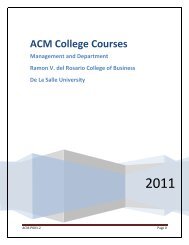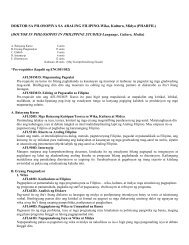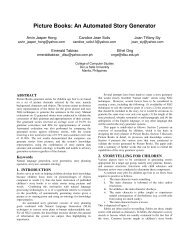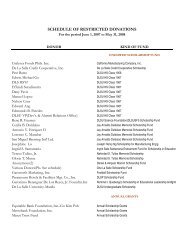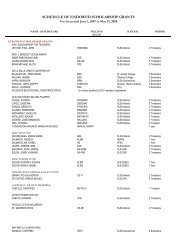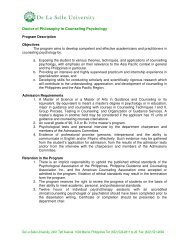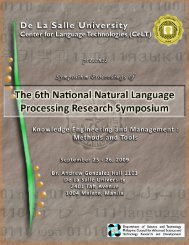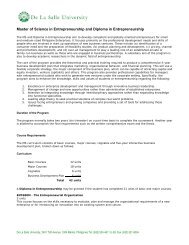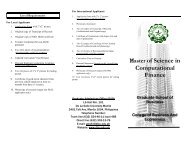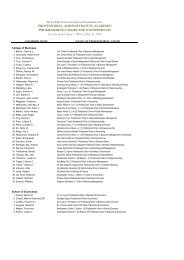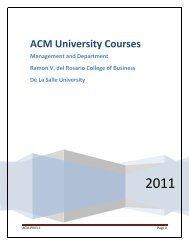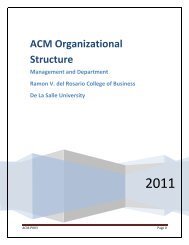doctor of philosophy in educational psychology - De La Salle ...
doctor of philosophy in educational psychology - De La Salle ...
doctor of philosophy in educational psychology - De La Salle ...
You also want an ePaper? Increase the reach of your titles
YUMPU automatically turns print PDFs into web optimized ePapers that Google loves.
DOCTOR OF PHILOSOPHY IN EDUCATIONAL PSYCHOLOGY<br />
Program <strong>De</strong>scription<br />
The PhD <strong>in</strong> Educational Psychology is designed for <strong>in</strong>dividuals who wish to pursue<br />
advanced scholarship and pr<strong>of</strong>essional practice <strong>in</strong> a specific area with<strong>in</strong> the various areas <strong>of</strong><br />
study and practice with<strong>in</strong> <strong>educational</strong> <strong>psychology</strong>. In particular, the program is designed to<br />
develop knowledge and skills for advanced scholarship and pr<strong>of</strong>essional practice that applies<br />
psychological approaches, theories, and methodologies to specific <strong>educational</strong> concerns.<br />
Students may choose to have a concentration <strong>in</strong> either (a) Learn<strong>in</strong>g and <strong>De</strong>velopment <strong>in</strong><br />
Schools, or (b) Quantitative Methods.<br />
Objectives<br />
The PhD <strong>in</strong> Educational Psychology <strong>in</strong> <strong>in</strong>tended for <strong>psychology</strong> students and<br />
pr<strong>of</strong>essionals <strong>in</strong>terested <strong>in</strong> psychological measurement <strong>in</strong> schools, learn<strong>in</strong>g and development <strong>in</strong><br />
schools, and <strong>in</strong> <strong>educational</strong> programs/<strong>in</strong>terventions for special populations such as children with<br />
special learn<strong>in</strong>g needs, the gifted, <strong>in</strong>digenous groups, adult learners, the elderly, among others.<br />
The curriculum provides students with a strong theoretical base for a more solid<br />
foundation for the contemporary foci <strong>of</strong> <strong>educational</strong> <strong>psychology</strong>, and research-oriented sem<strong>in</strong>ars<br />
to allow the students to develop strong and updated theoretical understand<strong>in</strong>g and research<br />
capacities <strong>in</strong> their specific areas <strong>of</strong> <strong>in</strong>terest. There will be a strong research focus <strong>in</strong> the<br />
program, where graduate students will be encouraged to actively <strong>in</strong>volve themselves <strong>in</strong><br />
research projects dur<strong>in</strong>g their graduate studies, with the view <strong>of</strong> present<strong>in</strong>g their research <strong>in</strong><br />
conferences and publish<strong>in</strong>g these <strong>in</strong> pr<strong>of</strong>essional journals <strong>in</strong> the field <strong>of</strong> <strong>educational</strong> <strong>psychology</strong>.<br />
Graduates <strong>of</strong> the PhD program will be <strong>in</strong> a good position to undertake research on<br />
different types <strong>of</strong> <strong>psychology</strong> related problems <strong>in</strong> the school sett<strong>in</strong>g, us<strong>in</strong>g a wide range <strong>of</strong><br />
research methods used <strong>in</strong> the field <strong>of</strong> <strong>educational</strong> <strong>psychology</strong>. Graduates <strong>of</strong> the PhD programs<br />
will also be qualified to do consultancy work <strong>in</strong> schools <strong>in</strong> their specific areas <strong>of</strong> concentration<br />
(e.g., as curriculum and learn<strong>in</strong>g specialists, teacher development specialists, learn<strong>in</strong>g program<br />
development consultants, research and evaluation consultants <strong>in</strong> specific programs, etc.).<br />
Admission Requirements<br />
1. Master’s degree <strong>in</strong> Psychology or Education or its equivalent, with 12 units <strong>of</strong><br />
graduate level <strong>psychology</strong> courses relevant to broad field <strong>of</strong> <strong>educational</strong><br />
<strong>psychology</strong>. Students who do not have these 12 units will be required to take<br />
prerequisite courses.<br />
2. An overall grade <strong>of</strong> 90, 3.0 or B+ <strong>in</strong> the master’s program.<br />
3. Admissions test and personal <strong>in</strong>terview by the department chairperson and/or<br />
members <strong>of</strong> the Admissions Committee.<br />
4. Clear statement <strong>of</strong> pr<strong>of</strong>essional plans and how the PhD <strong>in</strong> Educational<br />
Psychology fits these plans.<br />
5. Evidence <strong>of</strong> pr<strong>of</strong>essional promise (persona, <strong>in</strong>terpersonal and the ability to<br />
communicate <strong>in</strong> English and/or Filip<strong>in</strong>o effectively) for embark<strong>in</strong>g on a an active<br />
research career <strong>in</strong> the area <strong>of</strong> <strong>psychology</strong> and education. Such evidence may be<br />
gathered from the student’s application for admission, from the results <strong>of</strong> the<br />
admission tests and/or from the <strong>in</strong>terview with the chairperson and members <strong>of</strong><br />
the Admissions Committee.<br />
<strong>De</strong> <strong>La</strong> <strong>Salle</strong> University, 2401 Taft Avenue, 1004 Manila, Philipp<strong>in</strong>es Tel: (632) 524-4611 to 26; Fax: (632) 521-9094
PROGRAM REQUIREMENTS<br />
• Foundations courses 12 units<br />
• Basic courses 12 units<br />
• Core courses 12 units<br />
• Concentration courses 6 units<br />
• Concentration cognates 6 units<br />
• Dissertation 12 units<br />
• Qualify<strong>in</strong>g exam (one area) 0 units<br />
• Comprehensive exam (two areas) 0 units<br />
___________<br />
TOTAL 60 units<br />
Program Curriculum<br />
FOUNDATIONAL COURSES (12 units)<br />
CLG 201M Psychological Foundations <strong>of</strong> Counsel<strong>in</strong>g and Educational Psychology 1<br />
Survey and critical analysis <strong>of</strong> relevant historical theories and contemporary theories and<br />
research on personality <strong>psychology</strong>.<br />
CLG 203M Psychological Foundations <strong>of</strong> Counsel<strong>in</strong>g and Educational Psychology 3<br />
Survey and critical analysis <strong>of</strong> relevant historical theories and contemporary theories and<br />
research on developmental <strong>psychology</strong>, with emphasis on child and adolescent<br />
development.<br />
CLG 204M Psychological Foundations <strong>of</strong> Counsel<strong>in</strong>g and Educational Psychology 4<br />
Survey and critical analysis <strong>of</strong> relevant historical theories and contemporary theories and<br />
research on social <strong>psychology</strong>, with emphasis on group and <strong>in</strong>terpersonal processes,<br />
social cognition, and the cultural dimensions <strong>of</strong> behavior.<br />
CLG 205M Psychological Foundations <strong>of</strong> Counsel<strong>in</strong>g and Educational Psychology 5<br />
Survey and critical analysis <strong>of</strong> relevant historical theories and contemporary theories and<br />
research on cognitive <strong>psychology</strong>, with emphasis on theory and research that relates to<br />
human learn<strong>in</strong>g.<br />
BASIC COURSES (12 units)<br />
Any two <strong>of</strong> the follow<strong>in</strong>g: CPS531D to CPS535D (6 units)<br />
CPS 531D Advanced Sem<strong>in</strong>ar on Biological Basis <strong>of</strong> Behavior (3 units)<br />
Sem<strong>in</strong>ar course on current research and theory on the biological, neurological, and<br />
evolutionary basis <strong>of</strong> human behavior. Particular focus will be given to topics that are<br />
relevant to the study <strong>of</strong> counsel<strong>in</strong>g, cl<strong>in</strong>ical and <strong>educational</strong> <strong>psychology</strong>.<br />
CPS 532D Advanced Sem<strong>in</strong>ar on Cognitive-Affective Basis <strong>of</strong> Behavior (3 units)<br />
Sem<strong>in</strong>ar course on current research and theory on the cognitive and affective basis <strong>of</strong><br />
human behavior. Particular focus will be given to topics that are relevant to the study <strong>of</strong><br />
counsel<strong>in</strong>g, cl<strong>in</strong>ical and <strong>educational</strong> <strong>psychology</strong>.<br />
<strong>De</strong> <strong>La</strong> <strong>Salle</strong> University, 2401 Taft Avenue, 1004 Manila, Philipp<strong>in</strong>es Tel: (632) 524-4611 to 26; Fax: (632) 521-9094
CPS 533D Advanced Sem<strong>in</strong>ar on Social and Cultural Bases <strong>of</strong> Behavior (3 units)<br />
Sem<strong>in</strong>ar course on current research and theory, social <strong>psychology</strong>, social cognition,<br />
cross-cultural <strong>psychology</strong>, and cultural <strong>psychology</strong>. Particular focus will be given to<br />
topics that are relevant to the study <strong>of</strong> counsel<strong>in</strong>g, cl<strong>in</strong>ical, and <strong>educational</strong> <strong>psychology</strong>.<br />
CPS 534D Advanced Sem<strong>in</strong>ar on <strong>De</strong>velopmental Basis <strong>of</strong> Behavior (3 units)<br />
Sem<strong>in</strong>ar course on current research and theory <strong>in</strong> developmental <strong>psychology</strong> across the<br />
lifespan. Particular focus will be given to topics that are relevant to the study <strong>of</strong><br />
counsel<strong>in</strong>g, cl<strong>in</strong>ical and <strong>educational</strong> <strong>psychology</strong>.<br />
CPS 535D Philosophical and Theoretical Foundation <strong>of</strong> Modern Psychology<br />
(*for ID#08 and below only)<br />
This course covers the psychological orientations <strong>of</strong> the early 19 th century to the middle<br />
<strong>of</strong> the 20 th century and their philosophical roots. It deals with the major theoretical and<br />
philosophical positions, paradigms, theories, methods <strong>of</strong> <strong>in</strong>quiry and approaches to<br />
understand<strong>in</strong>g human behavior. The goal <strong>of</strong> the course is to facilitate the student’s<br />
discovery and understand<strong>in</strong>g <strong>of</strong> the shift<strong>in</strong>g paradigms to which scientific and<br />
psychological theories were founded and based. Furthermore, the course also <strong>in</strong>tends<br />
to <strong>in</strong>crease the awareness <strong>of</strong> the students on the different worldviews govern<strong>in</strong>g their<br />
own perspectives and appreciate the foundations <strong>of</strong> other people’s viewpo<strong>in</strong>ts.<br />
CPS 510P Advanced Statistics<br />
This is a 3-unit course for <strong>doctor</strong>al degree students <strong>of</strong> Counsel<strong>in</strong>g and Educational<br />
Psychology. It extends the students’ knowledge beyond the basic statistics at the<br />
master’s level. It <strong>in</strong>cludes topics on multivariate ANOVA, multiple regression, path<br />
analysis, cluster analysis and other multivariate analysis with manifest and latent<br />
variables.<br />
CPS 525P Research Methods I<br />
This course is the entry-level research methods course for students <strong>in</strong> the PhD<br />
Counsel<strong>in</strong>g Psychology and PhD Educational Psychology programs. The prerequisite<br />
course is CPS510D (Advanced Statistics) and the students are also expected to have<br />
completed a masters level course on methods <strong>of</strong> research. Thus, students are<br />
expected to be knowledgeable about the basic research designs (experimental and<br />
descriptive methods) <strong>in</strong> research and about multivariate procedures.<br />
CPS 527P Research Methods II<br />
This course provides the students with the rudiments necessary <strong>in</strong> design<strong>in</strong>g,<br />
implement<strong>in</strong>g, writ<strong>in</strong>g and dissem<strong>in</strong>at<strong>in</strong>g research outputs <strong>in</strong> the field <strong>of</strong> counsel<strong>in</strong>g<br />
<strong>psychology</strong>.<br />
CORE COURSES (12 units)<br />
EPS 712D Human <strong>De</strong>velopment and School<strong>in</strong>g<br />
Current Theories and research on cognitive development, l<strong>in</strong>guistic development,<br />
personal, social and emotional development that provide <strong>in</strong>sights <strong>in</strong>to how <strong>educational</strong><br />
experiences can be designed to promote student development <strong>in</strong> schools. Particular<br />
emphasis will be given on contemporary theories and research that emphasize the<br />
socio-cultural aspects <strong>of</strong> human development.<br />
<strong>De</strong> <strong>La</strong> <strong>Salle</strong> University, 2401 Taft Avenue, 1004 Manila, Philipp<strong>in</strong>es Tel: (632) 524-4611 to 26; Fax: (632) 521-9094
EPS 713D Cognition, Motivation, and Instruction<br />
Current theories and research on the nature and <strong>in</strong>teraction <strong>of</strong> cognitive and motivational<br />
processes <strong>in</strong> student learn<strong>in</strong>g, on how these are affected by <strong>in</strong>structional processes, and<br />
on how <strong>in</strong>structional systems can be designed <strong>in</strong> ways that facilitate the effective<br />
cognitive and motivational processes. Emphasis will be given on socio-cultural aspects<br />
<strong>of</strong> cognition and motivation.<br />
EPS 714D Psychology <strong>of</strong> Individual Differences<br />
A critical survey <strong>of</strong> current theories and research on psychological theories <strong>of</strong><br />
<strong>in</strong>telligence, cognitive styles, personality, motivation, values, and other <strong>in</strong>dividual<br />
different variables relevant to the <strong>educational</strong> processes.<br />
EPS 715D Psychological Assessment <strong>in</strong> Schools<br />
Current theory, approaches, and research on the assessment <strong>of</strong> learn<strong>in</strong>g <strong>in</strong> schools, the<br />
<strong>in</strong>fluence <strong>of</strong> assessment processes on student learn<strong>in</strong>g, and contemporary issues<br />
related to assessment <strong>of</strong> student learn<strong>in</strong>g.<br />
CONCENTRATION<br />
Concentration on Learn<strong>in</strong>g and <strong>De</strong>velopment <strong>in</strong> Schools (12 units):<br />
EPS716D Social and Cultural Aspects <strong>of</strong> Learn<strong>in</strong>g<br />
Advanced sem<strong>in</strong>ar on the various social and cultural dimensions <strong>of</strong> student learn<strong>in</strong>g and<br />
achievement <strong>in</strong> schools. The course will address issues <strong>of</strong> how social and cultural<br />
theories <strong>of</strong> learn<strong>in</strong>g and <strong>in</strong>struction can be applied to research on learn<strong>in</strong>g and<br />
achievement <strong>of</strong> Filip<strong>in</strong>o students and on improv<strong>in</strong>g teach<strong>in</strong>g, curriculum, and other<br />
aspects <strong>of</strong> the <strong>educational</strong> system.<br />
CPS622P Psychology <strong>of</strong> Motivation<br />
Study <strong>of</strong> the pr<strong>in</strong>ciples, dynamics <strong>of</strong> motivation and their application to the more complex<br />
aspects <strong>of</strong> learn<strong>in</strong>g.<br />
EPS717D Directed Read<strong>in</strong>gs <strong>in</strong> Educational Psychology<br />
The course is an advanced sem<strong>in</strong>ar on current research <strong>in</strong> <strong>educational</strong> <strong>psychology</strong>, with<br />
emphasis on theoretical and practical issues that apply to Philipp<strong>in</strong>e and Asian<br />
<strong>educational</strong> contexts. The course shall focus on a particular topic with<strong>in</strong> the areas <strong>of</strong><br />
human learn<strong>in</strong>g and development, psychological and/or <strong>educational</strong> measurement.<br />
Students are expected to complete an empirical research project as a part <strong>of</strong> the course.<br />
EPS718D Directed Research <strong>in</strong> Educational Psychology<br />
A course that will allow students to conceptualize and undertake a small-scale research<br />
project on a selected topic <strong>in</strong> the field <strong>of</strong> <strong>educational</strong> <strong>psychology</strong>.<br />
LIN805P Sem<strong>in</strong>ar on Research <strong>in</strong> Psychol<strong>in</strong>guistics<br />
LIN632P Bil<strong>in</strong>gualism and Bil<strong>in</strong>gual Education<br />
SCE535P Philosophical and Psychological Theories <strong>of</strong> Learn<strong>in</strong>g and Teach<strong>in</strong>g<br />
<strong>De</strong> <strong>La</strong> <strong>Salle</strong> University, 2401 Taft Avenue, 1004 Manila, Philipp<strong>in</strong>es Tel: (632) 524-4611 to 26; Fax: (632) 521-9094
EDM592P Specialized Curriculum Studies<br />
EDM593P <strong>De</strong>sign and <strong>De</strong>velopment <strong>of</strong> Alternative <strong>De</strong>livery Systems<br />
Concentration on Quantitative Methods (12 units)<br />
CPS722P Scal<strong>in</strong>g Theory<br />
Covers concepts, pr<strong>in</strong>ciples, and methods <strong>in</strong> scal<strong>in</strong>g. Exposes students to classroom<br />
and laboratory activities on the different scal<strong>in</strong>g methods (e.g., Likert, Thurston,<br />
Guttman, Metric and nonmetric multidimensional scal<strong>in</strong>g procedures are also <strong>in</strong>troduced.<br />
CPS723P Advanced Psychometric Theory<br />
This course compares both Classical Test Theory (CTT) and Item Response Theory<br />
(IRT) on test construction. In CTT, the estimates <strong>of</strong> item difficulty, item discrim<strong>in</strong>ation,<br />
and norm are discussed. In Item Response Theory overview <strong>of</strong> different mathematical<br />
models are presented with concentration on the Rasch model (one parameter logistic<br />
model) and its application <strong>in</strong> cognitive and noncognitive measures.<br />
CPS724P Evaluation I<br />
This course deals with the study <strong>of</strong> the different models and approaches for evaluat<strong>in</strong>g<br />
programs. It emphasizes both the quantitative and qualitative approaches to program<br />
evaluation. It also deals with the study <strong>of</strong> the different <strong>in</strong>struments/tools associated with<br />
the use <strong>of</strong> qualitative and quantitative approaches to evaluation.<br />
CPS725P Evaluation II<br />
This course provides the student with a comprehensive hands-on experience <strong>in</strong> the<br />
practice <strong>of</strong> evaluation <strong>in</strong> shap<strong>in</strong>g <strong>educational</strong> policy.<br />
CPS732P Performance Assessment<br />
Comprises a study <strong>of</strong> performance assessment – its nature, systems, and strategies –<br />
as applied <strong>in</strong> <strong>educational</strong> and other sett<strong>in</strong>gs. Includes monitor<strong>in</strong>g <strong>of</strong> performance<br />
assessment systems. Explores technical issues <strong>of</strong> <strong>in</strong>terpretation and application.<br />
EPS717D Directed Read<strong>in</strong>gs <strong>in</strong> Educational Psychology<br />
The course is an advanced sem<strong>in</strong>ar on current research <strong>in</strong> <strong>educational</strong> <strong>psychology</strong>, with<br />
emphasis on theoretical and practical issues that apply to Philipp<strong>in</strong>e and Asian<br />
<strong>educational</strong> contexts. The course shall focus on a particular topic with<strong>in</strong> the areas <strong>of</strong><br />
human learn<strong>in</strong>g and development, psychological and/or <strong>educational</strong> measurement.<br />
Students are expected to complete an empirical research project as a part <strong>of</strong> the course.<br />
EPS718D Directed Research <strong>in</strong> Educational Psychology<br />
A course that will allow students to conceptualize and undertake a small-scale research<br />
project on a selected topic <strong>in</strong> the field <strong>of</strong> <strong>educational</strong> <strong>psychology</strong>.<br />
PhDEPQ1 (Qualify<strong>in</strong>g exam); PhDEPW1 & PhdEPW2 (Comprehensive exam)<br />
Dissertation Writ<strong>in</strong>g 1 & 2<br />
An additional <strong>of</strong> six (6) units <strong>of</strong> Advanced Technical Read<strong>in</strong>g and Writ<strong>in</strong>g 1&2 will be required for applicants with a low<br />
score <strong>in</strong> the essay part <strong>of</strong> the entrance exam<strong>in</strong>ation. Students with weak background <strong>in</strong> masters-level research and<br />
statistics may be required to take CPS500M (Statistics) and CPS521M (Methods <strong>of</strong> Research)<br />
<strong>De</strong> <strong>La</strong> <strong>Salle</strong> University, 2401 Taft Avenue, 1004 Manila, Philipp<strong>in</strong>es Tel: (632) 524-4611 to 26; Fax: (632) 521-9094



